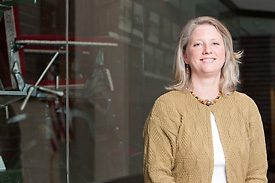Barrie Vorobiev spent time at a Black Sea resort in Bulgaria a few weeks after the devastating nuclear accident at Chernobyl, Ukraine, in April 1986, and while at the resort met people from the Soviet Union who had not heard of the accident.
This experience motivated Vorobiev to learn Russian, and she returned to U-M to pursue Russian language studies. After taking intensive Russian language courses at U-M, Vorobiev was determined to learn the language.

Photo by Scott Galvin, U-M Photo Services.
“I knew the only way to master a foreign language, for me, was to study in a country where the language was spoken,” she says.
Vorobiev graduated from U-M in December 1987 with a Bachelor of Arts in political science. She then applied to go to the Soviet Union with a program for college students who want to become Russian language teachers. From September to December 1988, Vorobiev was a student at the Institute of Steel and Alloys in Moscow.
Living and learning in the Soviet Union during the Cold War era was a memorable experience, she says. “As a student, I had relative freedom to do almost anything I wanted. However, we were restricted from interacting with the Soviet students who attended the same college,” says Vorobiev, registrar at the School of Dentistry. “Plus, everything was so cheap.”
The level of freedom changed, however, when, having aspirations of becoming a foreign service officer, Vorobiev started working in the Consular’s section at the U.S. Embassy in Moscow. “I entered a completely different world once I started at the Embassy. I was now required to report all contacts with Soviet citizens and I met many Americans stationed at the Embassy that had never left the compound out of fear. This was a dramatic lifestyle and psychological adjustment for me.”
After returning from the Soviet Union, Vorobiev decided she wanted to move east. “I moved to New York City and worked in an art gallery specializing in contemporary art from the Soviet Union for six years,” she says. Vorobiev met her future husband in the Big Apple. After they got married, the couple relocated to Alabama because of his work.
In 2004 Vorobiev moved back to Russia, this time with her husband and two children, because her husband had to relocate to Moscow with his job. “My experience this time was much more outlandish than the time I spent in the Soviet Union as a student,” Vorobiev says. “Moscow had become one of the most expensive places in the world to live and the disparity between the rich and the poor became truly evident; my mother-in-law, who lives in Russia, referred to our local grocery store as a museum.”
Vorobiev lived in an $8,500 a month penthouse apartment and mingled with other ex-patriots from countries like South Africa, Canada, Australia, Sweden, Denmark and Thailand.
Upon returning to the United States, Ann Arbor specifically, Vorobiev began working as a program coordinator in the Office of Multicultural Affairs in the School of Dentistry. She has also held positions in Student Services and Admissions.
Now as registrar in the School of Dentistry, she handles student records, oversees the academic calendar and organizes commencement for the school. In conjunction with the Academic Review Board, Vorobiev also monitors students’ progress toward graduation. Currently, she is working on winter course schedules and student registration.
In an effort to make the college experience rewarding for students, she says the School of Dentistry seeks student input and aims to be as interactive as possible. “This office is positive, upbeat and student-driven,” Vorobiev says.
Outside of work, Vorobiev says she enjoys volunteering. When she lived in Alabama, Vorobiev and her husband were Goodwill Ambassadors at Maxwell Air Force Base. “There were families from about 80 countries based in Montgomery for a year to study at the Air University and we hosted many families from Ukraine, Russia, Latvia and Moldova, basically anyone from the former Soviet Union that felt more comfortable speaking Russian than English,” she says.
Vorobiev and her husband also volunteered as language agents at the 1996 Atlanta Olympic Games. “It was a lot of fun and I will always treasure the memory of my small son holding up an Olympic gold medal that had just been awarded to an athlete from Russia. We worked as Russian interpreters and escorted athletes through doping control and press interviews after competitions,” she says.
Her other interests include traveling and cooking. “I haven’t had much time to travel in the last couple of years because of my children’s busy schedules, but my cooking has developed and become a hobby,” she says. “One dish I think I do pretty well is boeuf bourguignon.”
The weekly Spotlight features staff members at the university. To nominate a candidate, please contact the Record staff at [email protected].

